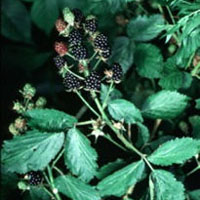Penn Herb Wellness Guide
BlackberryFind Products
 © Steven Foster
© Steven FosterParts Used & Where Grown
Blackberries grow in wet areas across the United States and Europe. Several species of blackberry exist: Rubus fructicosus is the most common European species and Rubus canadensis is a common North American species. While the leaves are used most frequently for medicinal preparations, the root is sometimes used as well.
- Reliable and relatively consistent scientific data showing a substantial health benefit.
- Contradictory, insufficient, or preliminary studies suggesting a health benefit or minimal health benefit.
- For an herb, supported by traditional use but minimal or no scientific evidence. For a supplement,little scientific support.
Our proprietary “Star-Rating” system was developed to help you easily understand the amount of scientific support behind each supplement in relation to a specific health condition. While there is no way to predict whether a vitamin, mineral, or herb will successfully treat or prevent associated health conditions, our unique ratings tell you how well these supplements are understood by the medical community, and whether studies have found them to be effective for other people.
For over a decade, our team has combed through thousands of research articles published in reputable journals. To help you make educated decisions, and to better understand controversial or confusing supplements, our medical experts have digested the science into these three easy-to-follow ratings. We hope this provides you with a helpful resource to make informed decisions towards your health and well-being.
This supplement has been used in connection with the following health conditions:
| Used for | Amount | Why |
|---|---|---|
Common Cold and Sore Throat | Refer to label instructions | Blackberry leaves contain astringent tannins that are helpful for soothing sore throats. |
Diarrhea | Refer to label instructions | Blackberry is an astringent herb traditionally used to treat diarrhea. |
Traditional Use (May Not Be Supported by Scientific Studies)
Since ancient Greek physicians prescribed blackberry for gout, the leaves, roots, and even berries have been used as herbal medicines.1 The most common uses were for treating diarrhea, sore throats, and wounds. These are similar to the uses of its close cousin, the red raspberry(Rubus idaeus), and a somewhat more distant relative, the blueberry(Vaccinium corymbosum).
Copyright 2025 TraceGains, Inc. All rights reserved.
Learn more about TraceGains, the company.
The information presented by TraceGains is for informational purposes only. It is based on scientific studies (human, animal, or in vitro), clinical experience, or traditional usage as cited in each article. The results reported may not necessarily occur in all individuals. Self-treatment is not recommended for life-threatening conditions that require medical treatment under a doctor's care. For many of the conditions discussed, treatment with prescription or over the counter medication is also available. Consult your doctor, practitioner, and/or pharmacist for any health problem and before using any supplements or before making any changes in prescribed medications. Information expires December 2025.


